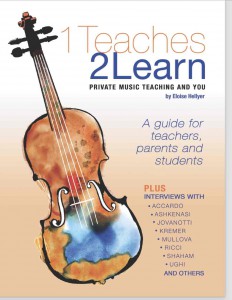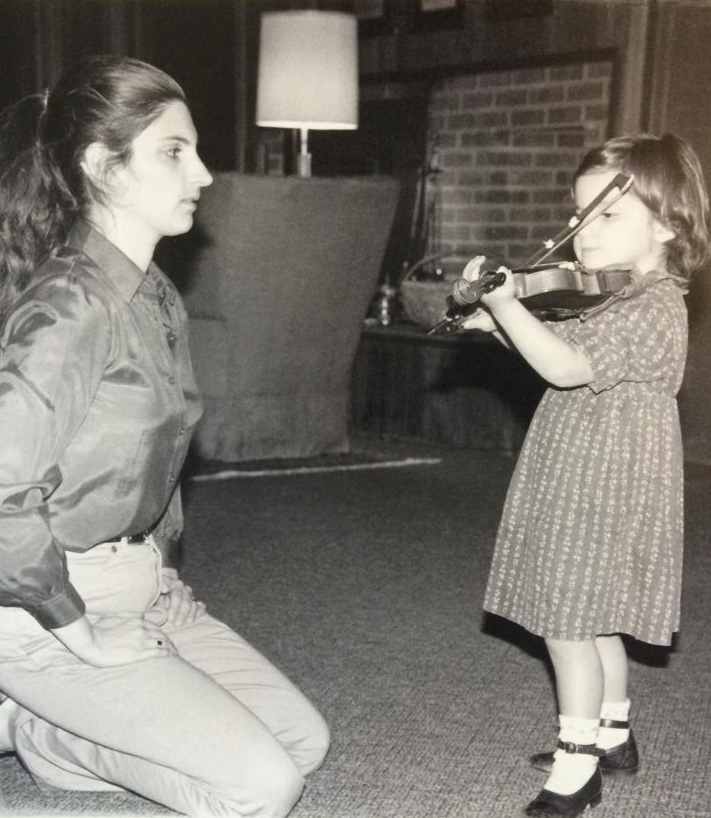Giving Birth to Talent
Dr, Suzuki called his method “Talent Education.” As all children have talent, it must be educated. But sometimes a student’s talent isn’t apparent. You teach all the right technique and make sure your students listen to their recordings, but some of them remain fairly stubbornly ensconced in their shells. So, what do you do? How do you educate something that hasn’t manifested itself? How do you cultivate something you can’t see yet?
What do I mean by talent? The ability to express a musical phrase with a beautiful tone in a way that will provoke emotion or recognition of beauty in the listener. You need a lot of technique for that. But technique isn’t enough, or we would all listen to computers instead of human beings. Computers don’t make mistakes.
So, first of all, we must realize that sometimes it takes a lot more than listening to music and good technical advice to get a child to show his talent.
I know and have known many teachers (including my own, many years ago) who think that talent will show up on its own—that the teacher has to do little, nay, should do little to help a student give birth to his talent other than show him how to move his hands, how to practice, and indicate what music to listen to.
But giving birth to talent can be very difficult for those who need more help than others. The interesting question we should ask ourselves is: when you see several mature musicians, can you tell the difference between those who needed that help and those who didn’t?
Here’s an analogy. Before you are four full-term, healthy babies about a month old, each one named Talent. All four mothers had the attentions of an obstetrician or midwife during labor and delivery.
Mother One had a very easy labor: one push and out popped baby. She really didn’t need the OB, except maybe to catch the baby and clean it up. She could have given birth in the fields by herself, as many of our forbears have done.
Mother Two had a long and painful labor and was helped by the obstetrician, who made it easier with pain control, etc., but this mother, too, probably could have managed on her own.
Mother Three had a long and difficult labor, a breech presentation, and the obstetrician or midwife had to manually turn the baby around. Mother and/or baby might have both perished otherwise.
Mother Four had lots of difficulties: too big a baby, fetal distress, placenta previa, or any other potentially fatal problem, and she required the professional services of an expert obstetrician and neonatal team; otherwise…
However, after a month (or even a few hours), by looking at these babies, all named Talent, could you tell which one was the product of an easy or incredibly difficult delivery?
The answer is, in a word, no. They are all beautiful babies, some prettier than others, some bigger than others, some louder, and some stronger, but they’re all named Talent. And none of them is any less or more successful when they grow up because of the ease or difficulty with which they had entered this world.
All successful students need teachers, just like all mothers need an OB or midwife to make sure things go as smoothly as possible. But the teacher, like the attending medical professional, has to be ready to go that extra mile. The mother needs a C-section at 3 a.m.? The doctor needs to be awake and ready, no matter what a long day he or she has had. A student doesn’t understand how to find his sound (as one teacher I know regularly asks of his students without giving any indication of how to do so)? We have to help such a student, even if it means explaining things we thought we would or should never have to explain to anyone.
Some kids are trapped by their personalities; they are laconic, speak in a monotone, have difficulty showing or expressing emotion, etc. They need help from a determined teacher and are glad to have it, even though they may seem uncomfortable when gently guided outside their comfort zone.
They may need different types of approaches: intellectual, spiritual, or physical. Some need all three and a few more perhaps no one has thought of yet. Others need varying sorts of the same explanations at different points in their learning career. After all, how can we expect students to find their sound and musicality, i.e., their talent, if we don’t help them become aware of what these are, what they mean, and the effect they can have on people (including on themselves)?
Here's the real danger: if we don’t help students find their self-expression, we risk that they only imitate what they hear or see, or that they do what they’re told instead of making something their own, the result being that nothing will be authentically theirs. Imitating is not the same thing as creating, although it’s often a good start. Great teaching helps students who are stuck make the breakthrough from one to the other.
I have interviewed a lot of fine musicians; what stood out is how important their first teachers were to them, both positively and negatively. Those who had had a positive experience as beginners had teachers who transmitted to them, or actively made them understand in one way or another, the wonders of music. They looked back fondly on those teachers. The others merely felt they had survived their early music education, notwithstanding the excellent technical preparation they had received. Perhaps it’s worth considering what we would like our students to say about us someday in the future. Did we help them give birth? Or did we leave them to labor alone in the fields?
Many say that you can’t create talent. Maybe not—the obstetrician doesn’t create the baby—but we can help students find it in themselves, and even they may be surprised at what they can accomplish if they are guided sensitively, compassionately, and without judgment.
Share this:
Buy it on www.sharmusic.com - eBook format, avaliable worldwide, paperback in North America
COPYRIGHT
ABOUT
A music teacher’s thoughts and observations on the teaching and the study of a musical instrument, hoping to be of help to parents, students and teachers.
PHOTO
AWARDED TOP 25 VIOLIN BLOG
CATEGORIES
TAGS
ARCHIVES
-
Agosto 2022
Agosto 2023
Agosto 2024
April 2015
April 2016
April 2017
April 2019
April 2020
Aprile 2022
Aprile 2023
Aprile 2024
August 2014
August 2015
August 2016
August 2017
August 2018
August 2019
August 2021
December 2014
December 2015
December 2016
December 2017
December 2018
December 2019
December 2020
Dicembre 2022
Dicembre 2023
Dicembre 2024
Febbraio 2022
Febbraio 2023
Febbraio 2024
February 2015
February 2016
February 2018
February 2019
February 2020
February 2021
Gennaio 2022
Gennaio 2023
Gennaio 2024
Giugno 2022
Giugno 2022
Giugno 2023
Giugno 2024
January 2015
January 2016
January 2017
January 2018
January 2019
January 2020
July 2015
July 2017
July 2019
June 2016
June 2017
June 2018
June 2019
June 2020
June 2021
Luglio 2022
Luglio 2023
Luglio 2024
Maggio 2022
Maggio 2023
Maggio 2024
March 2015
March 2016
March 2017
March 2018
March 2019
March 2020
March 2021
Marzo 2022
Marzo 2023
Marzo 2024
May 2015
May 2016
May 2018
May 2019
May 2020
November 2014
November 2015
November 2016
November 2017
November 2018
November 2019
November 2021
Novembre 2022
Novembre 2023
Novembre 2024
October 2014
October 2015
October 2017
October 2018
October 2019
October 2020
October 2021
Ottobre 2022
Ottobre 2023
Ottobre 2024
September 2014
September 2015
September 2016
September 2018
September 2019
September 2020
September 2021
Settembre 2022
Settembre 2023
Settembre 2024
RECENT POSTS
Terry G and Me, or Terry Gilliam on Where (or What) Practicing the Piano Will Get You…
The Teaching We Don’t Do Is More Important Than We Think
Overwhelmingness or What Teaching and Motherhood* Have in Common
Cellphone Serenity
How to Build Your Reputation – the Kind You Want
Desperate Times, Desperate Measures. Or How to Deal With Your Strong-Willed Stubborn Student and Survive
“Why Does My Teacher Get So Frustrated?” Letter to a Perplexed Student
Mount Rush-no-more….And How to Get There
Realizzato con VelociBuilder - Another Project By: Marketing:Start! - Privacy Policy




